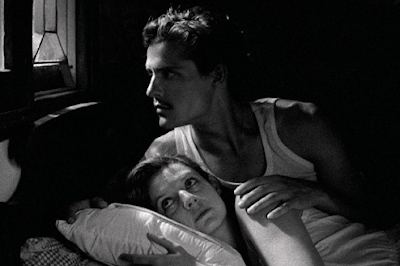Revolver Live! mit dem Kameramann Jürgen Jürges, im Rahmen der Diagonale Graz. Am 07.04.2024, 14 h. Mit Christoph Hochhäusler und Nicolas Wackerbarth.
1
In der neuen Ausgabe der Cahiers du Cinéma gibt es unter der Überschrift „Les films les plus attendus de 2012” einen Drehbericht über Leos Carax exzentrisches neues Projekt HOLLY MOTORS, der mich neugierig gemacht hat. Ausserdem werden neue Filme von Oliviera (GEBO ET L’OMBRE, mit Jeanne Moreau) und Kiarostami (LIKE SOMEONE IN LOVE, der in Japan entsteht) vorgestellt. Isabelle Huppert spricht über ihre Erfahrungen mit Brillante Mendoza (CAPTIVE, Berlinale Wettbewerb) und Hong Sang-Soo (IN ANOTHER COUNTRY). Eine bezaubernde Bildstrecke schliesslich widmet sich Miguel Gomes TABU (Berlinale Wettbewerb), ein Film, der laut Komplizenfilm „die Geschichte einer Liebe und eines Verbrechens im Afrika der Abenteuerfilme” erzählt. Hier drei Bilder:
2
In der neuen Ausgabe von Cineaste gibt es einen lesenswerten Schwerpunkt zum politischen Film heute. Unter anderen äussern sich Gianni Amelio („This is the paradox, or maybe it isn’t: political cinema, films of social intervention and opposition, are all the more necessary when the chances of reaching viewers are less.”), Olivier Assayas („I do not see cinema having any deep effect on the consciousness of individuals”), John Gianvito („If today I choose to make films, it is to remind myself first and foremost that there are more important things than films.”), Amos Gitai („In a strange way, I think that with all of these image rebellions expressed through social media, we are almost in the midst of a Jean-Luc Godard wet dream.”), Robert Guédeguian („In countries like France, if the quality of the film is strong, there are no obstacles.”), Kelly Reichardt („Historically, bad times bring better art. I’am not really sure why there weren’t large and small films post-Bush along the lines of 2001: A SPACE ODYSEE, THE GRADUATE, THE PARALLAX VIEW, APOCALYPSE NOW, etc”) und John Sayles („As a screenwriter for Hollywood movies, my job is often to take out factors which get in the way of a smooth flow of story or the percieved enjoyment of a mass audience, and these are often the political and economic realities of whatever era the movie is set in. In the case of my own movies, the closer to the present situation the film is dealing with, the more complaints from critics we get that the film has ‚an agenda‘ – as if this is in some way breaking a convenant with them or betraying what ‚the movies‘ are supposed to be about.”).
(Eingestellt von Christoph)





